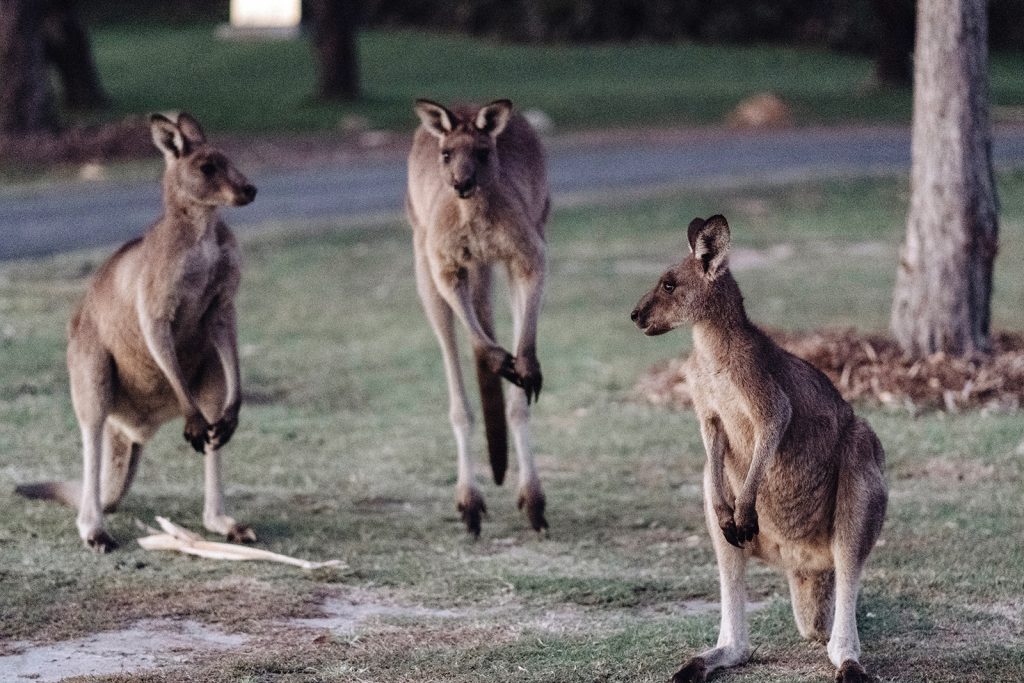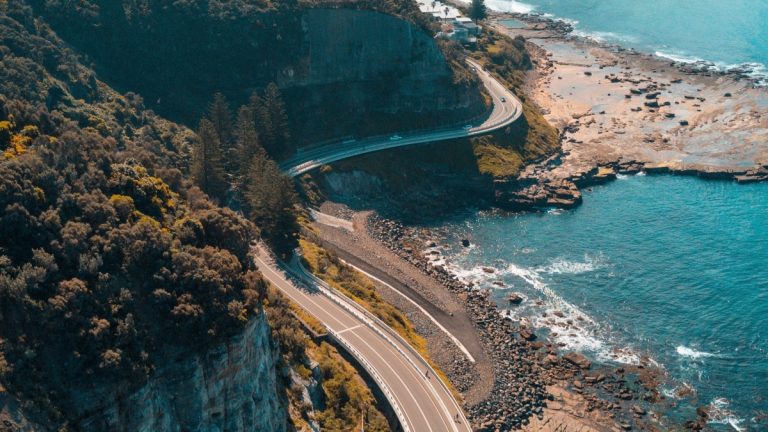
Going on a road trip in Australia is an incredible experience. Drive through the outback, explore secluded beaches and tropical rainforests, and sleep surrounded by nature. Travelling in a campervan offers the ultimate freedom to explore the country at your own pace, with the added benefit of having your accommodation on wheels. Here are some essential tips to ensure your campervan adventure in Australia is safe, enjoyable, and unforgettable.
Table of Contents
Choose the right Campervan
Size and Amenities: Select a campervan that suits your needs. Consider the number of passengers, the amount of storage space, and the amenities you require, such as a kitchen, bathroom, and sleeping arrangements.
Budget: Set a budget for your campervan rental. Compare prices from different rental companies and check for any hidden fees or charges.
Comfort and hygiene on your road trip
Shower and toilets
If you’re traveling in a vehicle without a shower or toilet, you will be dependent on public facilities during your road trip. Luckily, public infrastructure in Australia is usually clean, well maintained and free to access. If you’re driving along the coast and staying close to popular tourist areas, you will easily find showers (usually cold) and toilets at the entrance to most beaches.
In less touristy regions, there are fewer public showers. Public toilets are mainly available in towns, near beaches and at service stations. Otherwise there are always toilets and sometimes even self-service showers at tourist offices and visitor centres.
If you are in isolated regions of Australia, you can go to roadhouses and petrol stations, where you can often find amenities intended for truckers. You will have to pay around $2 per shower at gas stations, roadhouses and tourist offices. During your road trip, you will always find free rest areas where you can park your campervan. If you’re paying to park your campervan, you’ll often find toilets and sometimes showers at the site.
We recommend you consult a paper guide like Camps 12 (last edition or older version) or download the WikiCamps or Campermates mobile apps before your trip to check what amenities are available.
If you opt for a paid campsite or a caravan park, then you will have everything you need: hot showers, toilets, BBQ, sinks, laundry etc.
If you’re heading to the Outback, you can purchase a portable camping solar shower. These cost around $20 at outdoor/camping stores or even Kmart. Just fill it up and let it heat up in the sun for a few hours. Don’t forget to check the temperature before getting under the water! Wet wipes and no-rinse body washes are great for quick freshen-ups.
Public swimming pools are also a good way to cool off or access a hot shower. They are present in most cities, and generally cost around $6 to enter.
In some shopping centres in small towns, you can find free hot showers, like in Noosa in Queensland for example. Wet wipes are handy for when you don’t have access to a shower. If you want to be more ecological, a washcloth and a bottle of water is an even better alternative.
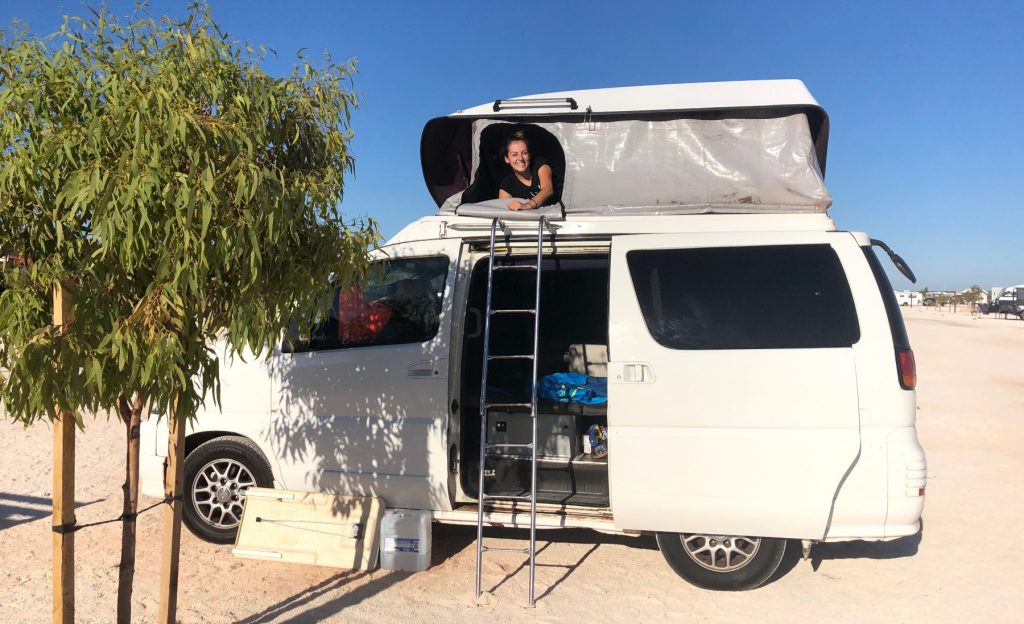
Doing your laundry on a road trip
You have two options for doing your laundry on a road trip: by hand, or at a laundromat.
In Australia, laundromats are widespread in all cities. A wash costs around $4 (it depends on the size of the chosen washing machine). At most laundromats, it’s up to you to bring your own detergent, stain remover and/or fabric softener.
If you are looking to save money on your road trip, you can always wash your laundry yourself. In Australia it is often hot and clothes dry quickly, especially if you’re washing small items like underwear, t-shirts, shorts etc. To do your own washing, you need to equip your van with a bucket or a basin, a little detergent and some string so you can hang up your laundry. Now all you need is somewhere to tie the string, like between two trees!
Van Cleanliness
Daily Cleaning: Sweep and wipe down surfaces daily to keep your living space clean. A small handheld vacuum can be handy for quick cleanups.
Organize Shoes: Keep a designated spot for shoes, preferably outside the living area, to avoid tracking dirt inside.
Trash Management: Use a small trash bin with a lid and empty it regularly. Always dispose of trash responsibly at designated areas.
Food and cooking tips on a road trip
Where to do your grocery shopping in Australia
Fresh fruit and vegetables and other fresh foods can be quite expensive in supermarkets in Australia, so you’re often better off getting these at small local markets. Supermarkets like Woolworths, Coles and Aldi are good for foods like snacks, cereals, legumes etc.
How to cook on a road trip
If you don’t already have one, you can equip your vehicle with a gas cooker. Admittedly, you be whipping up any Michelin-star meals with one of these, but they’re perfectly fine for cooking simple dishes. Remember that many public areas are equipped with barbecues, especially near beaches. These are self-service, so feel free to use them to grill your meat and vegetables outdoors.
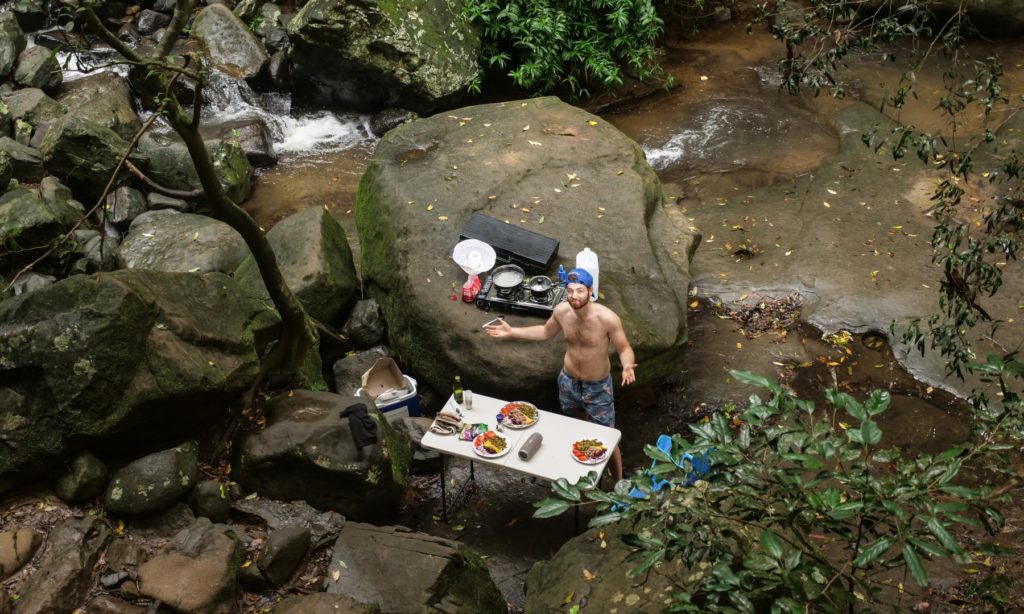
Meal Planning
- Plan Ahead: Create a meal plan for the week to make grocery shopping efficient and reduce food waste.
- Simple Recipes: Focus on easy-to-cook recipes that require minimal ingredients and cooking time. One-pot meals, salads, and sandwiches are great options.
- Non-Perishable Items: Stock up on non-perishable foods like pasta, rice, canned goods, and snacks. This ensures you have food on hand when fresh produce isn’t available.
Storing food
Storing food can be complicated on a road trip, especially if you don’t have a fridge. In this case, stock up on dry products like pasta, rice, quinoa, wheat, lentils and canned food, and buy new fresh products daily.
If you don’t have a fridge in your vehicle, you can use a cooler. You can buy bags of ice at all service stations to fill them up. In this case, remember to take well sealed containers. Watch out for cheap tupperware that doesn’t always do the trick. Airtight sachets or glass jars are generally more effective!
Store food securely and clean up promptly to avoid attracting insects or animals.
What to do with your rubbish on a road trip
You won’t always find bins when you’re on the road, but it’s never OK to litter or leave rubbish behind you. At “self contained” camping spots, you must bring all your waste with you, including food and waste water (eg. water from doing the dishes, your shower and toilet). Get yourself some garbage bags or use empty food containers until you can find a trash can.
Australia is a country of respect for others and for nature, and you it’s up to you to adopt this philosophy as well.
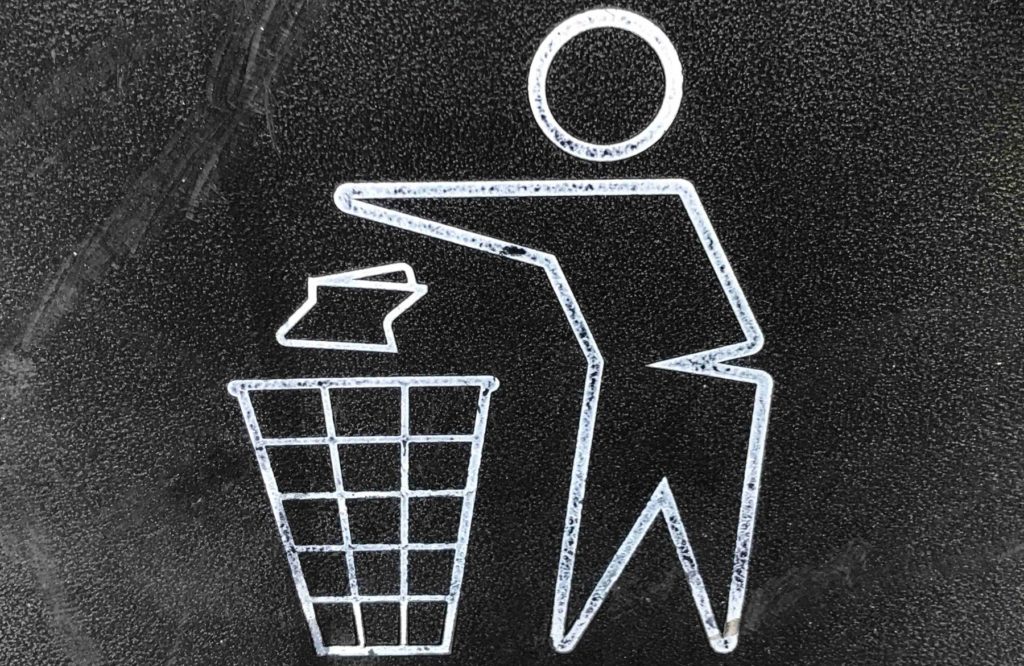
Manage your electronic devices and mail on a road trip
Telephone, Internet
Telstra and Optus are the most popular phone networks in Australia. Note that Telstra coverage is better in remote areas (yes, there is sometimes 4G in the outback!). Of course, some isolated areas won’t have enough service for you to connect to the internet at all. But in case of emergency, you can still use the call/SMS function.
Phone plans in Australia are expensive compared to Europe. Do your research to get the best offer and think about your needs in terms of data etc. For example, if you are staying in a city/town for a long time, you probably won’t need as much data because you can just use WiFi.
There are many useful road trip apps for your phone that can help you find things like camping spots, petrol stations and travel companions.
Read more: Phone plans in Australia
Receiving mail during your road trip
Postal services in Australia allow all travellers to use a poste restante or general mail system. That means you have the option of using an Australian post office address for free to receive your mail. The post office will keep your mail for a month before returning it to the sender. Make sure you check the address of the post office. If you are expecting a parcel or a courier and know that you will be in such and such a city at a given time, you can have it sent to the poste restante of that city.
Recharge your batteries
The easiest way to recharge your electronic devices is to install a second battery, in addition to the one already in your vehicle. This will recharge as soon as you drive your vehicle. Use it correctly at the risk of burning out the original battery and reducing its range. Many vans and 4×4 are equipped with a second battery, because this system allows you to recharge phones, computers, speakers, or even connect an electric cooler.
A second solution is to get a power inverter. This is a converter that plugs into the cigarette lighter of your vehicle and allows you to recharge, while driving, large equipment like a computer or camera.
If you spend the night in a campsite or caravan park, you can use their electricity. Whether you pay for a spot with electricity or not, you can always recharge your devices in the common rooms and bathrooms. There are also often electrical outlets in public places like the toilets of shopping centres, McDonalds, libraries etc. You can also decide to sit in a café and enjoy some banana bread while charging your computer.
Organization tips
Maximize space
- Use Vertical Space: Install shelves, hooks, and netting to utilize vertical space for storage. Over-the-door organizers can be useful for smaller items.
- Multi-Purpose Items: Opt for multi-purpose items like a table that doubles as storage or a bed that converts into seating.
- Collapsible Items: Invest in collapsible gear like bins, laundry baskets, and kitchen utensils to save space when not in use.
Stay organized
- Daily Reset: Spend a few minutes each day tidying up and putting things back in their designated spots. This prevents clutter from building up.
- Label Everything: Label storage containers and drawers to easily find items when needed.
- Keep Essentials Handy: Store frequently used items in easily accessible locations to avoid constantly unpacking and repacking.
Efficient packing
- Packing Cubes: Use packing cubes for clothes and personal items to keep them organized and compact.
- Seasonal Packing: Only carry clothes and gear appropriate for the current season. Store out-of-season items in a separate, less accessible area.
- Emergency Kit: Keep an emergency kit with first aid supplies, tools, and essential documents in an easily accessible location.
Travelling in a group
It’s not easy to share three square meters with the same people 24/7 for several weeks. You will need to make compromises, be tolerant and communicate well. It’s important to respect other people’s habits in order to travel harmoniously together. Tolerance comes with communication: if something bothers you, it’s best to talk about it.
To avoid arguments over the division of chores, why not make a plan from the start of your road trip? Divide groceries, dishes, itinerary and driving equally.
A little reminder: you don’t have to do everything as a group. Even if you’re on a trip with your partner, family or friends, you have the right to take time for yourself. A walk by the sea, reading your book alone in bed, going shopping or enjoying a coffee on your own in a café… it doesn’t matter what you do, it’s always a good idea to get some space if you feel like you need it.
Lighting a fire in Australia
Making a campfire next to your van is a special moment. You feel close to nature, sharing laughs with friends, maybe even cooking some fresh fish or s’mores! The smoky taste of the wood fire will bring a unique flavour to your dishes and will prevent you from wasting the gas in your stove.
However, it’s important to respect the rules when lighting a fire in Australia. During certain times of the year, lighting a campfire is strictly prohibited. Australia is regularly affected by bushfires, and in summer the level of vigilance is at its highest. At the entrance to national parks or campsites, a sign will indicate the level of fire risk and whether campfires are allowed. Parks and campsites often have dedicated places to make campfires: brick structures, metal, fire pits etc.
If you decide to make a fire:
- Check the ground: it must be composed of earth or sand, with no grass or vegetation
- Surround the fire with pebbles to stop it spreading
- Never leave the fire unattended: there must always be someone nearby
- Put out the fire completely before leaving the area or going to sleep
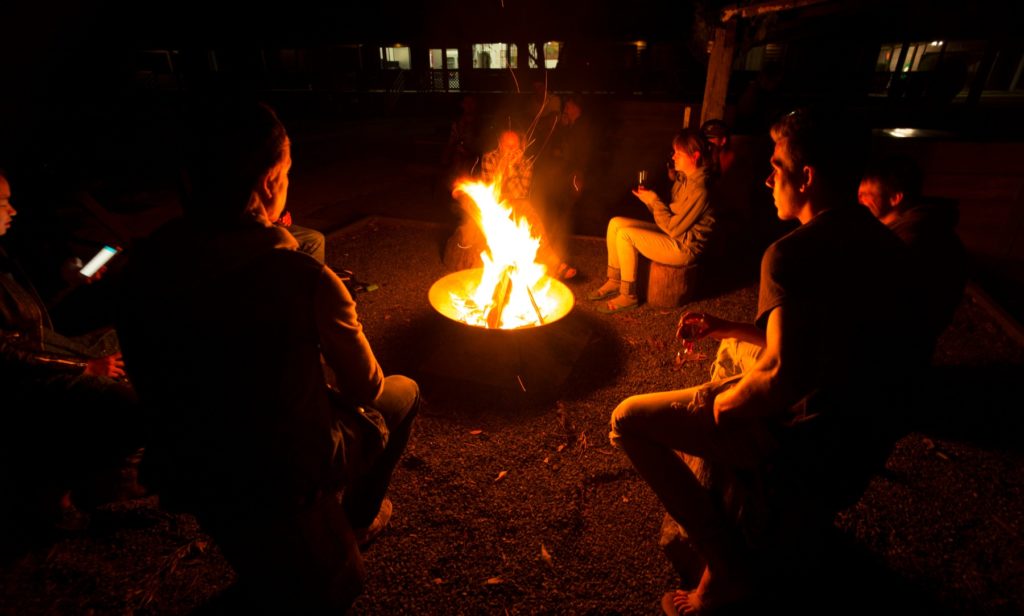
Animals on a road trip in Australia
Pests
Insects, especially flies and mosquitoes, are very common in all parts of Australia. It’s a good idea to install mosquito nets on the windows of your vehicle. This allows you to keep the windows open on hot nights, without opening the door to all those pests.
If you eat outside, remember the good old backpacker advice: don’t eat too near your camp site. If you are in an area where it is allowed and you can light a fire, the smoke keeps pests away.
Flies
“You eat them, you drink them, you breathe them”. This quote from John Hood, a Scotsman who came to Australia to visit his son in 1841, pretty much sums up the reality of some places in Australia. Unfortunately, flies can be VERY present during your road trip.
Quite rare in urban areas, they can become very troublesome in remote places, particularly in the North West and the centre of the country. Here are a few things you can do to avoid losing your mind due to annoying flies!
- Avoid wearing white and bright colors, which attract flies.
- Buy a fly net to put on a hat. You will find these in certain service stations, where the region is particularly affected, or in camping/outdoor shops.
- Try repellents, but they are often expensive and ineffective.
- Avoid leaving food lying around at all costs.
- Flies are generally less present in the shade.
- A fly swatter can be a good way to let off steam when you’re annoyed by flies, but won’t really get rid of them!
Mice
In some parts of the country, mice are ubiquitous and can easily get into your van. Close the doors when you are not in your vehicle and do not leave any food lying around. Mice love cheese, bread, fruit and even cereals. To avoid this kind of situation, put your groceries in tupperware or waterproof bags.
It is difficult to get rid of mice that decide to settle in your vehicle, so try to avoid them as much as possible!
Bedbugs
Bedbugs are quite common in Australia. Beware of mattresses in hostels, those bought on Gumtree or even found on the street. An inspection is always required! If you have bed bugs in your van or in your room, you will have multiple itchy bites on the same area of your body.
Seek the advice of a pharmacist to be sure of the origin of these bites. If you have bed bugs, call a professional to get rid of them. It is VERY difficult to get rid of these pests on your own.
Australian icons
Obviously, kangaroos will be an integral part of your road trip. There are as many kangaroos as people in Australia! You may also come across wallabies, kookaburras, koalas, snakes, sharks and crocodiles, depending on the region you’re in. Be careful on the road, and avoid driving at night if you can, to avoid the risk of collisions.
